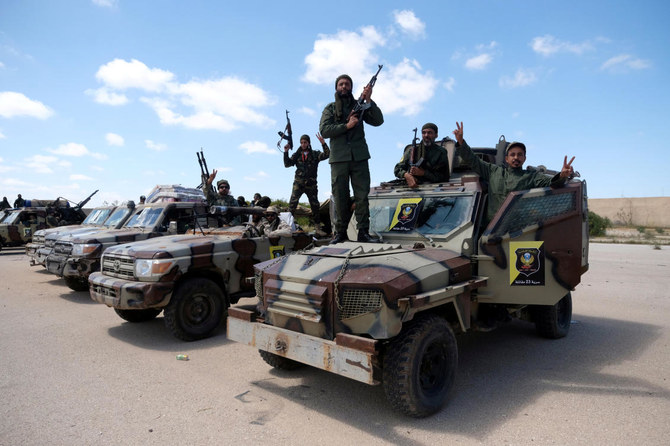BENGHAZI: Eastern Libyan forces will pursue their advance on the capital Tripoli, the head of the eastern parliament in the divided country said on Saturday, despite international calls for a halt in an offensive that risks causing many civilian casualties.
His comments came as more clashes rocked the southern outskirts of Tripoli, where eastern forces have been confronted by groups allied to Prime Minister Fayez Al-Serraj’s internationally recognized government.
The European Union last week urged the eastern Libya National Army (LNA) to stop its attacks, having agreed on a statement after France and Italy sparred over how to handle the conflict.
But the eastern parliament head said they would press an offensive launched a week ago under military commander Khalifa Haftar, the latest outbreak of a cycle of conflict since the 2011 overthrow of Muammar Qaddafi.
“We need to get rid of militias and terrorist groups,” Aguila Saleh, head of the House of Representatives allied to Haftar, said using a reference eastern officials often make to describe forces allied to the Tripoli government, which relies on support from several armed groups.
“We assure the residents of Tripoli that the campaign to liberate Tripoli will be limited and not violate any freedoms but restore security and fight terrorism,” Saleh told lawmakers in a session in the main eastern city of Benghazi.
Forces loyal to Al-Serraj’s government have so far kept the eastern offensive at bay. Fierce fighting has broken out around a disused former airport about 11 km (7 miles) from the center and an eastern military source said a warplane belonging to the LNA had struck a military camp in an eastern Tripoli suburb.
Saleh also said the United Nations mission to Libya and Serraj’s government had been controlled by armed groups and had failed to expel them from the capital, and promised Libya would hold long-delayed elections after the Tripoli operation ends.
Haftar’s offensive had surprised the United Nations, which had been planning to hold a national conference on April 14 to prepare Libya for elections.
The latest battle had by Friday killed 75 people, mainly fighters but including 17 civilians, and wounded another 323, according to UN tallies. Some 13,625 people have been forced out of their homes.
As well as the humanitarian cost, the conflict threatens to disrupt oil supplies, boost migration to Europe, scupper a UN peace plan, and allow militants to exploit the chaos.
Haftar, 75, a former general in Qaddafi’s army who later joined the revolt against him, moved his troops out of their eastern stronghold to take the oil-rich desert south earlier this year, before sweeping up to Tripoli at the start of April.
Eastern Libya parliament head says LNA forces will push Tripoli campaign
Eastern Libya parliament head says LNA forces will push Tripoli campaign

- The European Union last week urged the eastern Libya National Army (LNA) to stop its attacks
- Haftar, 75, moved his troops out of their eastern stronghold to take the oil-rich desert south earlier this year, before sweeping up to Tripoli at the start of April
UN rights chief Shocked by 'unbearable' Darfur atrocities

- Mediation efforts have failed to produce a ceasefire, even after international outrage intensified last year with reports of mass killings, rape, and abductions during the RSF’s takeover of El-Fasher in Darfur
PORT SUDAN: Nearly three years of war have put the Sudanese people through “hell,” the UN’s rights chief said on Sunday, blasting the vast sums spent on advanced weaponry at the expense of humanitarian aid and the recruitment of child soldiers.
Since April 2023, Sudan has been gripped by a conflict between the army and the paramilitary Rapid Support Forces that has left tens of thousands of people dead and around 11 million displaced.
Speaking in Port Sudan during his first wartime visit, UN Human Rights commissioner Volker Turk said the population had endured “horror and hell,” calling it “despicable” that funds that “should be used to alleviate the suffering of the population” are instead spent on advanced weapons, particularly drones.
More than 21 million people are facing acute food insecurity, and two-thirds of Sudan’s population is in urgent need of humanitarian aid, according to the UN.
In addition to the world’s largest hunger and displacement crisis, Sudan is also facing “the increasing militarization of society by all parties to the conflict, including through the arming of civilians and recruitment and use of children,” Turk added.
He said he had heard testimony of “unbearable” atrocities from survivors of attacks in Darfur, and warned of similar crimes unfolding in the Kordofan region — the current epicenter of the fighting.
Testimony of these atrocities must be heard by “the commanders of this conflict and those who are arming, funding and profiting from this war,” he said.
Mediation efforts have failed to produce a ceasefire, even after international outrage intensified last year with reports of mass killings, rape, and abductions during the RSF’s takeover of El-Fasher in Darfur.
“We must ensure that the perpetrators of these horrific violations face justice regardless of the affiliation,” Turk said on Sunday, adding that repeated attacks on civilian infrastructure could constitute “war crimes.”
He called on both sides to “cease intolerable attacks against civilian objects that are indispensable to the civilian population, including markets, health facilities, schools and shelters.”
Turk again warned on Sunday that crimes similar to those seen in El-Fasher could recur in volatile Kordofan, where the RSF has advanced, besieging and attacking several key cities.
Hundreds of thousands face starvation across the region, where more than 65,000 people have been displaced since October, according to the latest UN figures.














